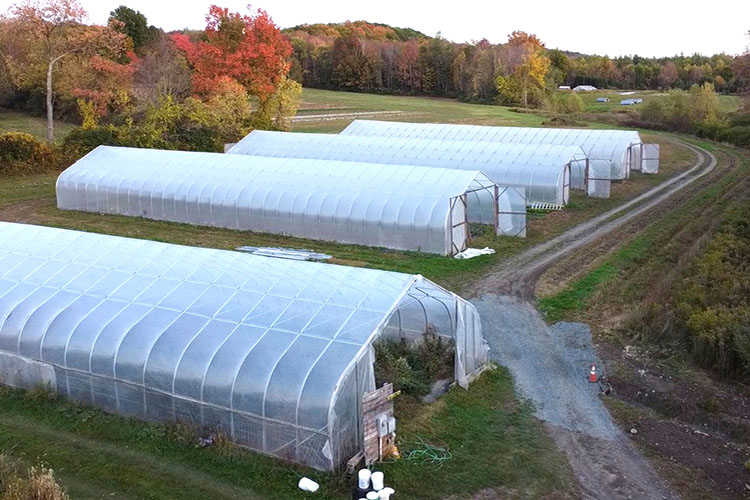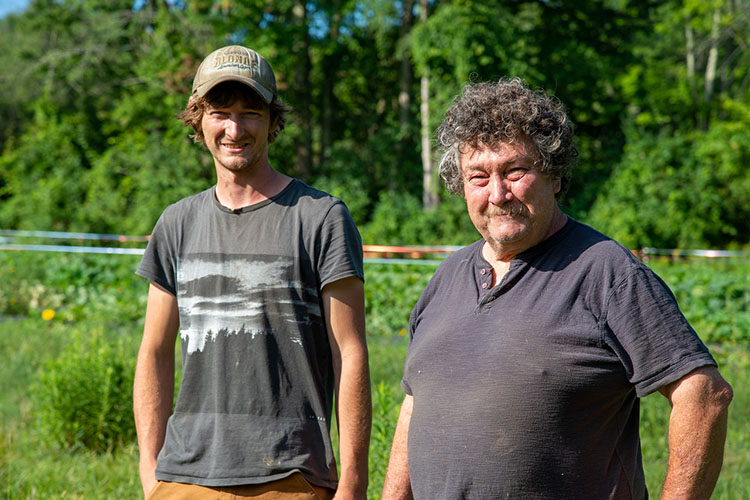
Apr 21, 2021
Conservation embraced at Vermont’s Boardman Hill Farm
Greg Cox is owner and operator of Boardman Hill Farm in West Rutland, Vermont. His diverse farm in west-central Vermont includes ten acres of organically certified fruits, vegetables, and flowers. He also manages a popular Community Supported Agriculture.
Starting with Soil
A native of New York, Greg attended Johnson State College in Vermont to be an educator. It was his experience in Vermont, and his connection to the environment and the landscape of the Green Mountain State, that motivated him to choose farming as a career. He developed a fondness for Rutland County while operating a farm in Wallingford from 1975 until he purchased his own farm in 1982.
Greg’s operation became one of the first certified organic farms in the area, but he didn’t do it alone. He farms with his twenty-four-year-old son, Avery, who is eagerly following in Greg’s footsteps.
“When I started farming there wasn’t much help, so my teachers were books,” Greg says. “I read a lot, figuring out what organic was, and learning about regenerative agriculture.”
His belief that health is ultimately tied to the food we eat and how it’s produced guides his farming principles.
“Farming is more than a financial transaction or a business. It’s critical to human health,” Greg says. “Our health is nutrient-based and that starts with soil.” He has embraced conservation and remains committed to improving and protecting soil and water quality.
Video by Johan Desrochers, NRCS Soil Conservationist in Vermont.
Conserving Year-Round
Local staff at USDA’s Natural Resources Conservation Service helped Greg implement a system of conservation practices through the Environmental Quality Incentives Program. Using the program, he installed four high tunnels to protect plants from extreme weather and enabled season extension by growing earlier in the spring and later into the fall.
“You can dine all year long,” he says. “The high tunnels make it possible. It’s the single biggest reason we can have a year-round food system in the Northeast, because things don’t grow during our cold, dark winter season.”
His conservation plan also included planting winter cover, which helps curb erosion between harvests and prevents nutrient runoff. He also addressed inefficient water use on irrigated land with a high-pressure underground plastic pipeline, micro-irrigation, mulching, pest management, and an irrigation water management system.
Additionally, his farmstead energy improvement plan reduces emission of greenhouse gases and reduces heat in an existing greenhouse on his farm. A controller system in the greenhouse also helps monitor conditions while a root zone heating system creates ideal temperature conditions needed to germinate crops for the coming growing season.
Greg believes that stewardship will pave the way for future generations. “I hope my son and my grandkids will have the capacity to use this farm and it will continue to produce food for our community,” he says.
Community and Sustainability

He has also dedicated time and effort to mentoring others by teaching agricultural classes at Green Mountain College in Poultney, Vermont, and using his own farm as a teaching tool for aspiring young farmers.
In 2016, he established a one-acre solar farm with 40 participating families. His effort received widespread acclaim, won several awards, and become a national model for similar solar development efforts. He was even recognized with a Governor’s Environmental Excellence Award.
In a state where the locavore movement was already solid, the pandemic has put an even greater focus on local agriculture and the availability of fresh produce.
“With more people eating at home now, they are putting more thought into their health and their food,” said Greg. “Previously, we relied heavily on wholesale and restaurants, but I had to adjust when everything shut down. It’s given us the ability to think and make positive changes in our lives and other people’s lives.”
Photos: USDA NRCS Vermont









